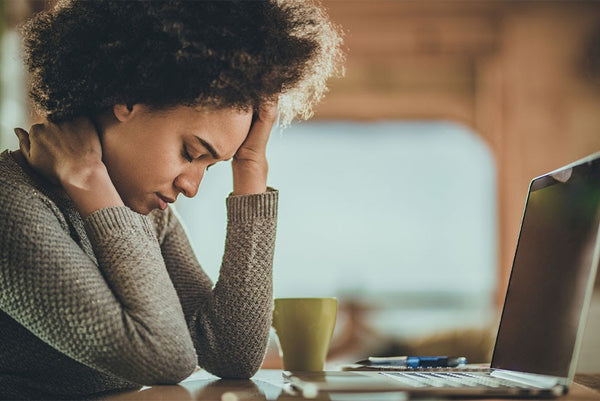
- adrenal function
- estrogen
- Health & Wellness
- insomnia
- irregular periods
- reproductive health
- weight gain
Have you been experiencing weight gain, irritability, chronic acne, poor-quality sleep, and/or an overall feeling of fatigue? These are all typical signs of a hormone imbalance.
Don’t go into an anxious spiral just yet, though. Nearly everyone goes through periods of fluctuating hormones at least once in their lifetime.
Puberty, menstruation, pregnancy, increased levels of stress, injury, trauma, and aging, are all possible causes.
Now, just as with any problem, the first step to solving a hormone imbalance is recognizing that it exists. That’s exactly what our guide is about.
We’ll be going through the most common signs of a hormone imbalance to help you identify it sooner and seek the appropriate remedies.
Read along to learn about:
- 10 Signs of a Hormone Imbalance
- 5 Hormone Imbalances to Look Out For
- How to Treat Hormone Imbalance
10 Signs of a Hormone Imbalance
Hormones have control over our entire life: our energy level, mood, bodily functions, and coping mechanisms are all hormonal. Hence, when our hormones are out of balance (when the body produces too much or too little of a certain kind), we start to feel unwell.
If left untreated, hormone imbalance symptoms can become really concerning and affect our daily positivity, comfort, relationships, work performance, and overall quality of life.
To help you recognize hormonal imbalance symptoms, we’ll be explaining 10 of the most common signs of hormonal imbalance in women and men you should look out for.
#1. Insomnia

Ever heard of the saying “a ruffled mind makes a restless pillow”? There’s a hormonal explanation for that.
Your adrenal glands are responsible for producing cortisol (the stress hormone) into your system. This hormone triggers your fight or flight response - both your blood pressure and heart rate increase and you’re at a constant state of alertness.
So, if you overstress right before going to bed, you produce too much cortisol and, unfortunately, set yourself up for sleepless, tormenting nights. This is known as adrenal fatigue.
Other external factors can also mess with your hormones and deprive you of a good night’s sleep. These include the use of caffeine, tobacco, alcohol, and certain prescription medicine.
If you’re facing adrenal fatigue, and seek natural healing methods to improve your adrenal function, you can check out our guide on 11 proven ways to boost adrenal function.
#2. Irregular Periods

For women, there’s a number of life cycles that can influence hormone balance and cause an irregular menstruation cycle.
These include puberty, pregnancy, breastfeeding, perimenopause, and menopause. They aren’t health problems, but natural life transitions and, over time, estrogen and progesterone levels are supposed to balance themselves out.
Polycystic ovary syndrome (PCOS) and hypothyroidism are two of the most common conditions that cause irregular periods in women.
Women with PCOS produce higher-than-normal amounts of androgen (the male hormone). This causes infrequent or prolonged menstrual cycles. If a doctor diagnoses you with PCOS, you’ll usually be recommended birth control pills or other hormones to trigger your period.
If you have hypothyroidism, your thyroid gland doesn’t produce enough thyroid hormone. You’re less energetic and your body processes slow down, including your periods. For this condition, you may need to take thyroid hormones.
#3. Hormonal Weight Gain

Do you eat healthily, exercise, sleep 8 hours a night, and still struggle to lose weight? Or maybe you’re trying out a diet and it just isn’t giving any results.
Despite popular belief, our weight isn’t simply a reflection of the number of calories we consume and burn. Most diets don’t work because they don’t address the hormonal reason behind weight loss resistance.
An excess of cortisol, insulin and leptin, estrogen dominance, an underactive thyroid, or low testosterone are all responsible for hormonal weight gain in men and women. For women, PCOS and menopause can also be to blame.
#4. Chronic Fatigue

As we already mentioned, your hormones are the key to controlling your energy levels.
For starters, the thyroid gland is responsible for your metabolism. If your thyroid is underactive, you might feel fatigued, restless, anxious, and have trouble going to sleep.
Additionally, the right estrogen balance helps you maintain high energy levels. When you don’t eat enough, or when you exercise too hard, your estrogen levels drop, causing a feeling of tiredness and fatigue. Low testosterone levels have that same effect.
Lastly, if you’re living in a stressful environment, cortisol could be responsible for your fatigue. Cortisol helps our bodies cope with stress. Thus, overproduction of cortisol can lead to low energy, exhaustion, difficulty sleeping, irritability, and trouble concentrating.
If you want to learn ways you can take control of your emotions and energy levels, head over to our guide on how to balance your hormones naturally (for men & women).
#5. Depression or Mood Swings

Depression can be genetic, situational, seasonal, as well as hormonal.
For men, low levels of testosterone can cause them to become moody, irritable, and less energetic. This typically happens over time, as they age.
The most common one amongst women is postpartum depression. The condition causes depressed mood, excessive crying, loss of appetite, inability to sleep, for a long period of time. It needs to be treated with medication, therapy, and self-care practices.
Postpartum depression shouldn’t be confused with “baby blues”, though, which doesn’t last more than two weeks and goes away on its own.
#6. Brain Fog or Trouble Concentrating

Fluctuations in estrogen and progesterone can cause dizziness, or make you feel “foggy.” This makes it harder to concentrate and remember things. The sign is more common in women during the menstrual cycle and menopause.
Eating a hormone balance diet, avoiding coffee and alcohol, regular exercising, and a good night’s sleep is the best cure for this symptom. If none of the above seem to improve your quality of life, then it may be necessary to check with a healthcare professional.
#7. Digestive or Gut Issues

Sex hormones affect the level of bacteria in your gut and how your gut functions.
In some instances, this can cause foods to pass through your body faster than usual, and lead to diarrhea, nausea, or stomach pain. Other times, the opposite can happen, causing periods of constipation, gas, or bloating.
What’s behind these symptoms?
Usually, a hormone imbalance of female-specific hormones: estrogen and progesterone. That’s why women are six times more likely to experience an irritable bowel syndrome (IBS).
#8. Chronic Acne

You’re probably thinking: wasn’t I supposed to shake off acne during my teenage years? Sadly, that’s not always the case - hormonal acne can affect adults of any age.
Fluctuations in estrogen and progesterone, an overproduction of testosterone, and high levels of cortisol can all cause hormonal acne.
If you’re not sure whether your acne is hormonal, here are some of the most common signs, according to dermatologists:
- Pimples around your chin and jawline
- Painful cysts (deep bumps under the skin’s surface)
- Breakouts usually occur once a month, in a cyclical pattern
#9. Headaches

Many factors can cause headaches, but as far as hormone imbalance is concerned, high levels of estrogen are a common cause amongst women.
Why? Well, estrogen levels are responsible for the sensation of pain.
During menstruation, levels of estrogen and progesterone fall to their lowest levels, triggering a headache. Whereas when a woman’s pregnant, estrogen is high and hormonal headaches tend to go away.
Usually, hormonal headaches come paired up with other symptoms such as:
- Cravings for sugar, salt, and alcohol
- Acne
- Fatigue
- Lack of concentration and coordination
High estrogen levels can occur in men too - read why here!
#10. Low Libido

Low libido (or low sex drive) is a common issue that affects both men and women at some point in their life. There’s a number of causes to it, such as stress, relationship issues, and tiredness, but it can also result from an underlying hormonal imbalance.
Other signs to look for include:
- Fatigue
- Vaginal dryness
- Erectile dysfunction
- Vaginal dryness
- Mood shifts
- Breast tenderness.
5 Hormone Imbalances to Look Out For
While there’s a variety of hormone imbalances, our modern lifestyles put us all at risk for developing a few specific ones over others. These include:
1. Estrogen Dominance
Estrogen is a female sex hormone whose main role is to promote growth. The hormone supports bone strength and maintains normal cholesterol levels.
Estrogen dominance occurs when the endocrine system produces too much estrogen. The condition can be genetic, or due to poor dieting, weight gain, and bad liver function.
How does it affect the body? The most common symptoms you’ll likely experience include heavy and painful periods, low libido, mood swings, anxiety, migraines, and bloating.
For more information on estrogen dominance, check out our guide on high estrogen in women.
2. Low Testosterone
Testosterone is responsible for a man’s appearance, sexual development, and sex drive.
Though it typically decreases as men age, doctors have been recently seeing low testosterone levels in younger and younger men. This is mainly due to chronic stress, alcohol abuse, and obesity.
Look out for:
- Low sex drive
- Erectile dysfunction
- Hair loss
- Low semen volume
- Loss of muscle mass
- Mood swings
3. Thyroid Imbalance
In the front of your neck, below your Adam’s apple, a butterfly-shaped gland called the thyroid is located. The thyroid’s main responsibility is to regulate your metabolism and heart rate. It also determines how fast you burn calories and your overall energy levels and mood.
An overactive thyroid can lead to anxiety, unexplained weight loss, thinning hair, and fragile skin. On the other hand, an underactive thyroid slows down your metabolism and causes fatigue, constipation, dry skin, and weight gain.
4. Cortisol Imbalance
Your cortisol is your body’s built-in alarm system. The hormone controls your stress levels, mood, motivation, and fears.
Too much cortisol can lead to anxiety, depression, headache, weight gain, and sleeping troubles. Too little of it may cause you to feel constantly tired, have low blood pressure, muscle weakness, and a loss of appetite.
5. Insulin Imbalance
Insulin regulates the glucose in your body. It helps the glucose in our blood enter our cells, so we can then turn it into usable energy.
When we consume too much sugar, are consistently under stress, and don’t work out, we’re setting ourselves up for an insulin imbalance. This leads to a group of issues such as obesity, high blood pressure, and type 2 diabetes.
How to Treat Hormone Imbalance
There’s no quick-fix to hormone imbalances. The solution depends on the exact hormone that’s out of balance and its underlying cause.
That’s why you should always check with a healthcare professional, first.
With this being said, here are some of the most common medical treatment options and natural remedies for hormonal imbalance:
- Estrogen therapy is used to treat common menopausal symptoms through estrogen hormones.
- Testosterone therapy increases muscle mass and energy, and controls weight.
- Thyroid therapy treats an underactive thyroid when natural thyroid levels are low.
- Birth control pills regulate women’s menstrual cycle, improve hormonal acne, and reduce body and facial hair.
- Regular exercising has been shown to boost your serotonin, estrogen, and testosterone levels.
- A hormone balanced diet contains foods high in nutrition, protein, and fiber, such as salmon, seaweed, broccoli, cauliflower, kale, avocados, bell peppers, and more.
- Vitamins and supplements. Our top supplements recommendations for hormonal imbalances include:
- Go With The Flow contains four hormone-balancing herbs that treat PMS, PCOS, and hormone imbalance during menopause. It's been shown to help with mental and emotional relaxation, hormone balance, and the easing of unpleasant physical symptoms.
- Ashwagandha Root has been used for hundreds of years in Ayurvedic medicine to relieve anxiety symptoms and improve overall hormone levels. It reduces cortisol levels, protects and boosts your immune system, and relieves stress.
- Organic Maca is well-known for its ability to provide long-lasting energy, mental clarity, and estrogen, progesterone, and testosterone balance. It also aids in the treatment of menopause symptoms and boosts fertility, libido, and a healthy reproductive system.
Key Takeaways
When we have control over our hormones, we have control over our entire lives. That’s why it’s so essential to recognize the signs of a hormone imbalance and seek the necessary treatment.
For a quick recap, the top 10 most common signs of a hormone imbalance include:
- Insomnia
- Irregular periods
- Hormonal weight changes
- Chronic fatigue
- Depression and mood swings
- Brain fog
- Digestive issues
- Chronic acne
- Headaches
- Low libido
